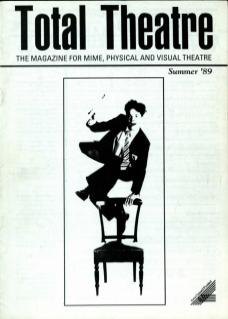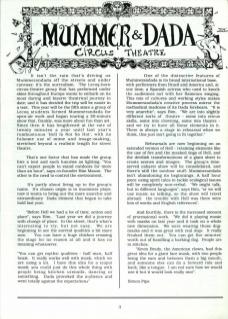It isn’t the rain that’s driving Mummer & Dada off the streets and under canvas: it’s the surrealism. The Lecoq-born circus-theatre group that has performed under skies throughout Europe wants to embark on its most daring and bizarre theatrical journey to date; and it has decided the trip will be easier in a tent. This year will be the fifth since a group of Lecoq students formed Mummer & Dada for open-air work and began touring a twenty-minute show that, frankly, was more about fun than art. Since then it has lengthened at the rate of twenty minutes a year until last year’s rumbustious Hell Is Not So Hot, with its fulsome use of mime and image-making, stretched beyond a realistic length for street theatre.
That’s one factor that has made the group hire a tent and such luxuries as lighting. ‘You can't expect people to stand outdoors for more than an hour,’ says co-founder Bim Mason. The other is the need to control the environment.
It’s partly about living up to the group’s name. It’s chosen origin is in mummers plays: now it wants to bring out the more anarchic and extraordinary Dada element that began to take hold last year.
‘Before Hell we had a lot of time, action and place,’ says Bim. ‘Last year we did a journey with change of place. In the street, that’s what’s interesting to try, but not easy. We are beginning to see the surreal qualities a bit more now. You can have a huge chicken crossing the stage for no reason at all and it has no meaning whatsoever.’
‘You can get mythic qualities – half man, half beast. It really works well with mask, which we are using a lot. I have this idea for a teapot mask: you could just do this whole thing with people being kitchen utensils, dancing or something. Dada provoked the audience and went totally against expectations.’
One of the distinctive features of Mummer & Dada is its broad international base, with performers from Brazil and America and, at one time, a Spanish actress who used to knock the audiences out with her flamenco singing. This mix of cultures and working styles makes Mummer & Dada’s creative process mirror the methodical madness of its Dada forebears. ‘It is very anarchic,’ says Bim. ‘We are into slightly different sorts of theatre – some into circus skills, some into clowning, some into theatre – and we try to have all these elements in it. There is always a stage in rehearsal when we think, this just isn’t going to fit together.’
Rehearsals are now beginning on an extended version of Hell – retaining elements like the use of fire and the masked dogs of Hell, and the devilish transformations of a giant sheet to create scenes and images. The group’s timeserved cabaret show will be consolidated, and there’s still the outdoor stuff: Mummer & Dada isn’t abandoning its beginnings. A half-hour piece using spirit tales to tackle ecological issues will be completely non-verbal. ‘We might talk, but in different languages,’ says Bim, ‘or we will use music as talking, so the show will travel abroad: the trouble with Hell was there were lots of words and English references.’
And fourthly, there is the increased amount of processional work. ‘We did it playing music with masks on last year and it took on a whole new dimension. We were wearing those dog masks and it was great with real dogs. It really freaked them out. You can get five minutes worth out of handling a barking dog. People are in stitches.’
‘Kevin Brady, the American clown, had this great idea for a giant face mask, with two people being the ears and between them a big mouth, and someone else can do a forward roll and back, like a tongue. I am not sure how we would use it but it would look really nice.’

